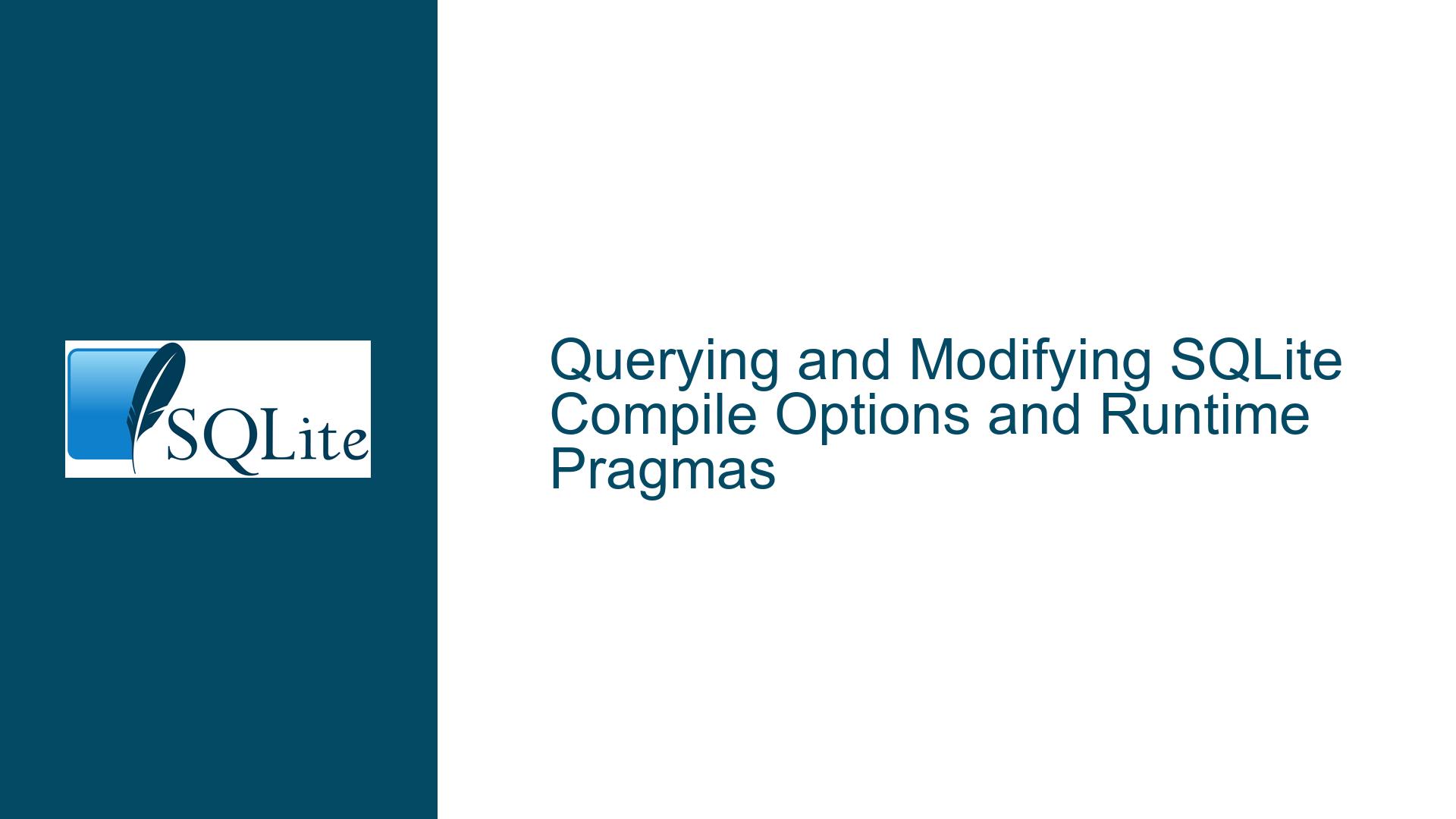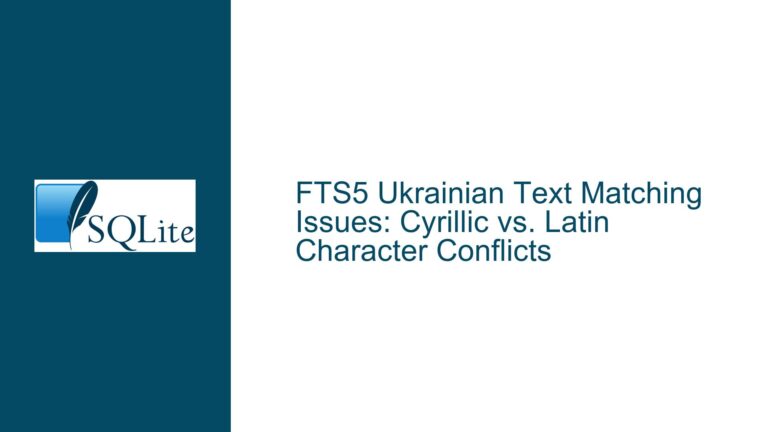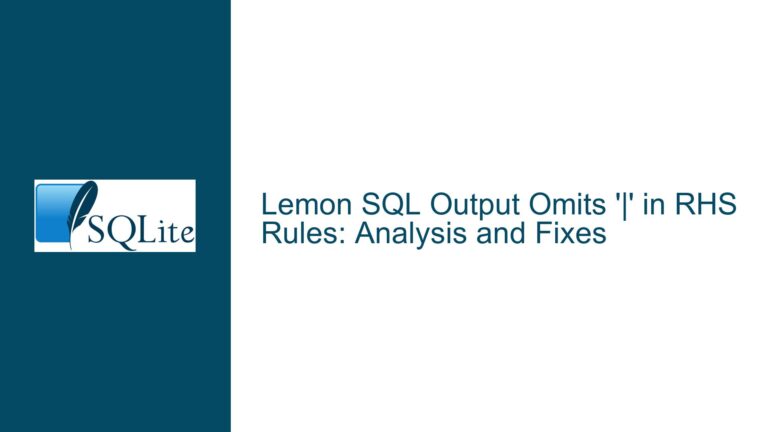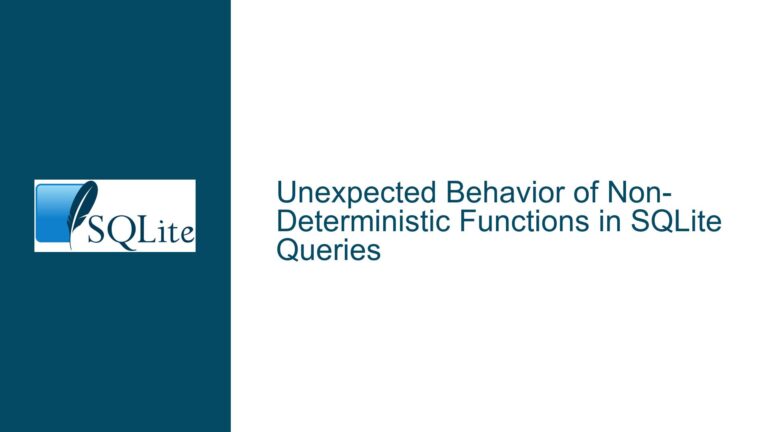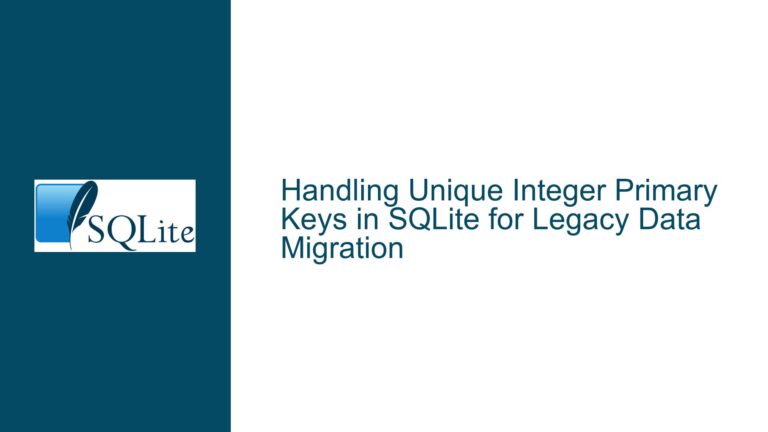Querying and Modifying SQLite Compile Options and Runtime Pragmas
Querying SQLite Compile Options and Runtime Pragmas
SQLite is a powerful, lightweight, and highly configurable database engine that offers a wide range of compile-time options and runtime pragmas. These options and pragmas allow developers to fine-tune the behavior of SQLite to meet specific requirements. However, understanding how to query these options and pragmas, as well as how to modify them, can be a complex task. This guide will provide a detailed exploration of how to query SQLite compile options, understand their implications, and modify runtime pragmas to achieve desired behaviors.
SQLite compile options are settings that are determined at the time the SQLite library is compiled. These options can influence various aspects of SQLite’s behavior, such as memory management, concurrency, and performance. Runtime pragmas, on the other hand, are settings that can be modified while the database is in use. These pragmas allow developers to adjust the behavior of SQLite on-the-fly, without needing to recompile the library.
To query the compile options that were used when the SQLite library was compiled, you can use the pragma_compile_options table. This table contains a list of all the compile options that were enabled during the compilation process. The following SQL query can be used to retrieve this information:
SELECT * FROM pragma_compile_options;
This query will return a list of all the compile options that were enabled when the SQLite library was compiled. Each row in the result set will contain a single compile option. For example, you might see options such as SQLITE_THREADSAFE=2, SQLITE_ENABLE_JSON1, or SQLITE_DEFAULT_WAL_AUTOCHECKPOINT=1000.
Understanding these compile options is crucial for diagnosing issues and optimizing performance. For instance, the SQLITE_THREADSAFE option determines the level of thread safety provided by the SQLite library. A value of 0 means that SQLite is not thread-safe, while a value of 2 means that SQLite is fully thread-safe. Knowing which options are enabled can help you understand the limitations and capabilities of your SQLite installation.
Interplay Between Compile Options and Runtime Pragmas
The relationship between compile options and runtime pragmas is a nuanced one. While compile options are fixed at the time the SQLite library is compiled, runtime pragmas can be adjusted to modify the behavior of the database engine. However, the availability and effectiveness of certain pragmas may depend on the compile options that were enabled.
For example, the SQLITE_DEFAULT_WAL_AUTOCHECKPOINT compile option sets the default number of pages in the Write-Ahead Logging (WAL) file that triggers an automatic checkpoint. This option can be overridden at runtime using the PRAGMA wal_autocheckpoint pragma. However, if the SQLITE_DEFAULT_WAL_AUTOCHECKPOINT option was not enabled during compilation, the PRAGMA wal_autocheckpoint pragma will have no effect.
Similarly, the SQLITE_ENABLE_JSON1 compile option enables support for JSON functions in SQLite. If this option was not enabled during compilation, any attempt to use JSON functions at runtime will result in an error. Therefore, it is essential to understand which compile options were enabled in order to determine which runtime pragmas and features are available.
In some cases, it may be possible to enable certain features at runtime by loading extensions. For example, if the SQLITE_ENABLE_JSON1 option was not enabled during compilation, you may still be able to use JSON functions by loading the JSON1 extension. However, this is not always possible, and some features may be permanently disabled if the corresponding compile option was not enabled.
Modifying Runtime Pragmas and Their Implications
Runtime pragmas in SQLite provide a powerful mechanism for adjusting the behavior of the database engine without needing to recompile the library. These pragmas can be used to control various aspects of SQLite’s behavior, such as memory usage, concurrency, and performance. However, modifying these pragmas can have significant implications, and it is important to understand the potential impact of these changes.
One of the most commonly used pragmas is PRAGMA journal_mode, which controls the journaling mode used by SQLite. The journaling mode determines how SQLite handles transactions and ensures data integrity. The available journaling modes include DELETE, TRUNCATE, PERSIST, MEMORY, and WAL. Each of these modes has different performance characteristics and trade-offs.
For example, the WAL (Write-Ahead Logging) mode provides better concurrency and performance for write-heavy workloads, but it requires additional configuration and maintenance. The PRAGMA wal_autocheckpoint pragma can be used to control how often SQLite performs automatic checkpoints in WAL mode. Setting this pragma to a lower value can reduce the size of the WAL file, but it may also increase the frequency of checkpoints, which can impact performance.
Another important pragma is PRAGMA synchronous, which controls how SQLite handles disk synchronization. The synchronous pragma can be set to OFF, NORMAL, or FULL. Setting this pragma to OFF can improve performance by reducing the number of disk synchronization operations, but it also increases the risk of data corruption in the event of a power failure or system crash. On the other hand, setting this pragma to FULL ensures that all changes are written to disk before a transaction is considered complete, but it can significantly impact performance.
The PRAGMA cache_size pragma controls the size of the in-memory cache used by SQLite. Increasing the cache size can improve performance by reducing the number of disk I/O operations, but it also increases memory usage. The optimal cache size depends on the specific workload and available system resources.
It is also important to note that some pragmas are persistent, meaning that their settings are saved in the database file and will be applied automatically when the database is opened. For example, the PRAGMA journal_mode and PRAGMA synchronous pragmas are persistent, while others, such as PRAGMA cache_size, are not. Understanding which pragmas are persistent is important for ensuring that the desired settings are applied consistently.
In conclusion, querying and modifying SQLite compile options and runtime pragmas is a complex but essential task for optimizing the performance and behavior of SQLite databases. By understanding the relationship between compile options and runtime pragmas, and by carefully considering the implications of modifying these settings, developers can fine-tune SQLite to meet their specific requirements. Whether you are diagnosing an issue, optimizing performance, or enabling new features, a thorough understanding of these options and pragmas is crucial for getting the most out of SQLite.
